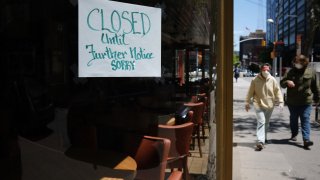
In an
"We could pay for a package right now to cover all of the wages, lost wages for individual workers, for losses to small companies, to medium-sized companies or city, state, county governments. We could do all of that," Osterholm said. "If we did that, then we could lock down for 4 to 6 weeks."
Osterholm is the director of the Center for Infectious Disease Research and Policy at the University of Minnesota.
Elise Gould, senior economist with the Economic Policy Institute, tells CNBC Make It this federal approach is a step in the right direction and points out it's been the intention of various federal stimulus, including the Paycheck Protection Program and enhanced unemployment insurance, enacted in the spring.
"Health experts have been talking about this all along, to stay home and make it financially viable for people to do so," Gould says.
Money Report
However, she says any new aid should address inefficiencies of past stimulus, particularly income caps on PPP loans, as well as widespread difficulty for employers and jobless workers to access federal funds. A national plan could help states issue benefits to workers more efficiently.
Gould says another misstep from the CARES Act was setting the expiration of enhanced benefits based on a calendar date rather than current economic conditions. Unemployment recipients stopped receiving the extra $600 weekly enhancement when it expired at the end of July. Now, more than 13 million workers could lose their jobless aid entirely by the end of December when two CARES Act provisions, Pandemic Unemployment Emergency Compensation and Pandemic Unemployment Assistance, are set to expire.
The U.S. labor market has still not recovered roughly 10 million jobs lost during the coronavirus-induced recession, and more than 21 million Americans are currently receiving jobless benefits.
While private-sector jobs are slowly recovering, Gould says more investments should be targeted toward state and local governments in order to recover job losses in the public sector.
Furthermore, "what we've learned from the spread of the virus is that it is not contained, and if we really want to get a handle on this, we need to take steps to limit the spread," Gould says.
Other countries have paid workers to stay home
On Monday, President-elect Biden announced a new coronavirus task force that consists of 13 physicians, public health experts and researchers. He outlined a seven-point plan for how his administration will address the pandemic, including more mask mandates, quicker Covid-19 testing, paid sick leave and uniform social-distancing guidance.
Meanwhile, new coronavirus cases are spiking around the country. Coronavirus advisor Osterholm told CNBC Monday that the U.S. is headed toward "Covid hell" this winter as cases continue to surge above 100,000 per day. "The next three to four months are going to be, by far, the darkest of the pandemic," he said.
Osterholm has been vocal about the need for a national lockdown and says state-by-state measures have proven ineffective. Uniform restrictions across the U.S., he told Yahoo Finance, could bring case numbers down "like they did in New Zealand and Australia." Epidemiologists have pointed to New Zealand, Australia and several parts of Asia such as South Korea and Taiwan as examples of how to contain the virus.
Several countries have instituted national lockdowns and paid workers to stay home during the pandemic. In March, Denmark spent 13% of the country's national economy to cover 75% of wages for employees at private companies for three months, according to The Atlantic. That would be roughly equivalent to a $2.5 trillion aid package in the U.S. spread out over 13 weeks.
Other European countries are extending their government aid, with Britain in October instituting a second national lockdown and continuing its $50 billion furlough program to pay up to 80% of private-sector salaries, The Washington Post reports. A similar model in the U.S. would cost $390 billion.
The $2.2 trillion CARES Act passed by Congress in March included a $600 weekly enhancement to unemployment benefits, a number intended to help the average person recover 100% of their lost wages. Without the bonus, state-provided unemployment generally covers 34% to 54% of a worker's previous income. President-elect Biden previously said on his campaign website he will work with Congress to extend the extra $600 per week in federal unemployment benefits for "however long this crisis lasts."
Speaking to Yahoo Finance about paying workers to stay home, Osterholm said, "we could really watch ourselves cruising into the vaccine availability in the first and second quarter of next year while bringing back the economy long before that."
In Washington, however, Congress and White House officials have not come to an agreement about renewed stimulus aid after months of negotiations.
Check out: Don't miss: Best credit cards for Black Friday and Cyber Monday shopping of 2020
Don't miss:
Here’s what President-elect Joe Biden wants to include in a coronavirus stimulus bill
More than 13 million people could lose their unemployment benefits at the end of December
Covid-19 patients twice as likely to be working from an office instead of home, CDC finds






